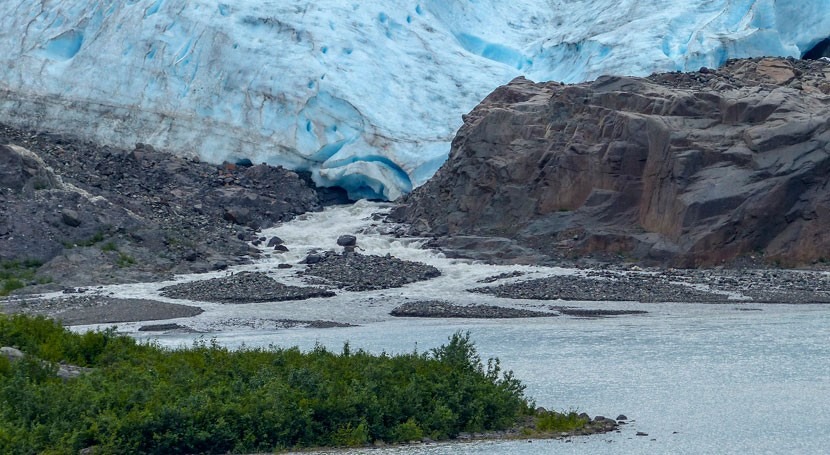During the Nature Champions Summit, Intact Financial Corporation announced a commitment of $2.3 million to 16 Canadian charitable partners – from coast to coast – focused on protecting Canadians from the impacts of climate change.
"Climate change is having an enormous human and economic impact," said Charles Brindamour, CEO of Intact. "Canadians – especially government and business leaders – can lead the way in addressing and managing the associated risks. By making our country one of the most climate resilient in the world, we can protect our nature, our economy and our people."
The 16 selected charitable partners explore concrete solutions for managing climate change, including how the maintenance and restoration of natural assets can protect against flooding. For example, ALUS Canada: A Weston Family Initiative, recipient of $248,000, aims to establish natural infrastructure projects on environmentally-sensitive, marginal agricultural lands to increase water retention, decrease overland flood, lower erosion risks and filter water.
"As this week's Summit has made clear, nature and natural resources are, and have always been, among Canada'sgreatest assets," said Brindamour. "It is becoming increasingly apparent that these resources can be harnessed as critical infrastructure and leveraged to manage the risks associated with climate change. We have a responsibility to advance this work to ensure the long-term resilience of our country."
Quick Facts
- From 2009 to 2015, the Federal Disaster Financial Assistance Arrangements payment to provinces was more than the previous 39 years combined.
- Floods in Central and Eastern Canada have cost our economy more than $3 billion in the last two years – and 40 per cent of property claims are flood related.
- Last year, the Insurance Bureau of Canada revealed that the average cost of a flooded basement is $43,000.
- Not only do natural assets help maintain biodiversity, they can act as a strong complement or a viable alternative to built infrastructure options for flood mitigation.
- According to a 2018 report by Insurance Bureau of Canada, Intact Centre on Climate Adaptation and International Institute for Sustainable Development (IISD), wetlands can reduce flood damages by 40 per cent.
As part of its commitment to building more resilient communities, Intact has been at the forefront of climate change adaptation in Canada for the past ten years. In 2015, the company established – by funding $4.25 million – the Intact Centre on Climate Adaptation at the University of Waterloo, an applied research centre dedicated to helping Canadians cope with the effects of extreme weather and climate change. The Intact Centre focuses on developing practical solutions for Canadian homeowners, including through a dedicated home flood protection program and the development of new flood and building code standards in collaboration with Canadian governments.
The Intact Foundation will be investing another $1 million in climate adaptation projects in 2019. Applications from charitable organizations will be accepted starting in September.
Current Charitable Partners:
- ALUS Canada – implementing natural infrastructure projects in marginal or inefficient-to-farm agricultural lands.
- Bluenose Coastal Action – working directly with municipal partners in southwest Nova Scotia to locate, design and install low impact development projects (LIDS) with the aim of improving storm water management.
- Community Forests International – reversing the clearcutting trend and embracing new financial tools that incentivize natural infrastructure improvement for flood risk reduction.
- Conseil régional de l'environnement et du développement durable de l'Outaouais – reducing the impact of urban heat islands by implementing urban greening initiatives.
- Ducks Unlimited Canada – restoring urban wetlands as a form of natural infrastructure that will increase community resiliency through flood mitigation while also enhancing water quality, wildlife habitat and outdoor recreation opportunities.
- FireSmart – addressing the need for a standardized system that offers defendable, detailed customized wildfire risk assessments and tracked measurable risk reduction for homes.
- Green Calgary – promoting flood prevention through rainwater harvesting.
- Green Learning Canada Foundation – engaging youth through flood education, with the goal of helping them prepare their homes and schools for a flood event.
- Nature-Action Québec – shoreline restauration of the Hazen Bleury and Barbotte rivers targeted for their vulnerability to flood
- Nature Québec – helping municipalities reduce the number of heat islands and air pollution through heat island mapping, public awareness and urban greening
- Nature Conservancy of Canada – protecting and restoring wetlands in Ontario and Quebec to help reduce the impact of severe storms.
- The Miistakis Institute of the Rockies Inc. – creating a least conflict lands planning tool to guide placement of large scale solar and wind projects.
- Sentier Urbain – creating urban gardens to improve water management and reduce CO2 emissions in the Garden Circuit in Southern Montreal.
- University of Alberta – developing a computer program that recognizes large-scale atmospheric patterns that lead to extreme fire weather using AI.
- University of British Columbia – developing post-fire recovery strategies to prevent future forest fires and increase climate resilience in 21 Canadian communities.
- WWF-Canada – restoring water to the urban landscape to improve water management and strengthen Montreal'sresilience by uncovering underground rivers and recreating new urban rivers.



